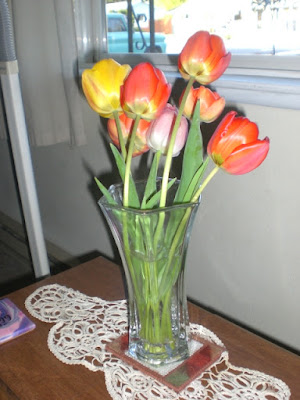Grandson Number 2 was frustrated that
day he came to my home after school. We'd fought our way through his
arithmetic worksheet and now he had one for social studies. “I
can't do it,” he whined. “Yes, we can,” I countered. “The
answers are in the encyclopedias.”Our second-hand bookcase wasn't quite
wide enough for the entire encyclopedia set,
thus a humorous break with a "boo"!
Okay, for a half-way-through-grade-school kid of the internet age, encyclopedias rank up there with dinosaur bones. Ones still needing to be dug up. But I wanted him to discover that, despite their fading reputation in our internet age, encyclopedias have a lot to offer. So I led him to my home's book-cased set and helped him find what he needed to know.
I grew up before the virtual age, when “smart kids” often had home encyclopedia sets (my childhood home did!). I enjoyed looking up various topics. Yes, I know, I was different. But I did graduate as one of the top ten academically in my high school class. My only “B” grades were in physical education. (I married an elementary p.e. teacher—go figure!) And I thank my parents for encouraging me to study—and for putting out all that money for encyclopedias.
Fast-forward to marriage and children—and a teacher-husband with a similar “encyclopedia” upbringing. At one point, he decided to sell sets to bring in extra income. And he sold just enough sets for us to have our own.
Mix two children into that—a boy and girl who were encouraged to do their best at school. Yes, the home bookcase with the world's facts and figures, A-Z, occupied a prominent place in the living room. And they used them. Graduated from high school at the top of their class. Earned amazing scholarships to college.
Francis Bacon, 16th century philosopher and statesman, is famed for this quote: “Reading maketh a full man, conference [discussion] a ready man, and writing an exact man.” If you think about it, reading takes a lot of concentration. It expands one's vocabulary and knowledge, and helps us evaluate situations we encounter in our modern world. And sitting down with a book with a succinct article about a certain subject is a sure winner for exploring questions about the world we live in—past and present.
By the way, we also invested in a mega-size world atlas. Both my son and daughter had an eighth grade teacher who emphasized map-reading and detailed work sheets. Their perception of the world went way beyond our valley, and that was a good thing.
Yet even as I advocate use of reference aids like encyclopedias and atlases, I'm grateful I've gone a step-further in reference aids for my passion: learning about God's Word. The top shelf of my desk has Bible dictionaries, commentaries, various Bible translations, and books to help me sleuth out the meaning of Hebrew and Greek words.
Would Francis Bacon have used such resources? Maybe, if available in his time. Biographers have lots of opinions about the boundaries of his religious beliefs. I won't go there. But I will agree with him that books still reign. And especially the Book above all books. I think about that as I read the end of the Gospel of John, where the aging apostle declares:
Jesus did many other things as well. If every one of them were written down, I supposed that even the whole world would not have room for the books that would be written. (John 21:25)




